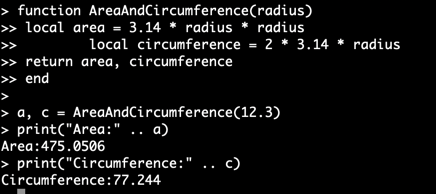Functions & Operators
01/19/21 08:38 Filed in: Lua
Let's look at Lua functions today.
Functions
Last time I talked about scope and Lua blocks of code which are called "chunks". A function, in Lua, is a named chunk of codde using the syntax:
function name([parameters])
— code here
end
And here is an example that prints "Hello Lua" and takes no parameters:
function HelloWorld()
h = "Hello"
w = "Lua"
print(h .. " " .. w)
end
Calling a function is similar to other languages. You use the name of the function followed by any arguments in parentheses.
HelloWorld()
Here is an example that multiplies two numbers:
function MultiplyTwoNumbers(x,y)
local result = x * y
print(x .. "*" .. y .. "=" ..result)
end
MultiplyTwoNumbers(3,217)
This is what it looks like when you run it:

The number of arguments and parameters doesn't have to match in Lua. Extra arguments are ignored. Too few arguments are passed in with a nil value. Of course, if you use the missing argument in a way that doesn't make sense, you'll get an error as in the second call to MultiplyTwoNumbers here.

As in other languages, Lua functions can return values using a return statement.
function MultiplyTwoNumbers(x,y)
local result = x * y
local answer = x .. "*" .. y .. "=" .. result
return answer
end
print(MultiplyTwoNumbers(3,217))
Lua can also return more than a single value from within a function. Unlike other languages, this is not treated as a tuple.
function AreaAndCircumference(radius)
local area = 3.14 * radius * radius
local circumference = 2 * 3.14 * radius
return area, circumference
end
a, c = AreaAndCircumference(12.3)
print("Area:" .. a)
print("Circumference:" .. c)

You can ignore trailing return values. So in this example I could have said:
a = AreaAndCircumference(12.3)
I haven't looked to see if there is a way to ignore leading or embedded return values.
Operators
Most of the Lua operators are standard (or familiar).
- +
- -
- *
- /
- % (modulo)
- ^ (exponent)
- ==
- ~= (not equal)
- <
- >
- <=
- >=
- and
- or
- not
I've mentioned one unique operator, concatenation.
- ..